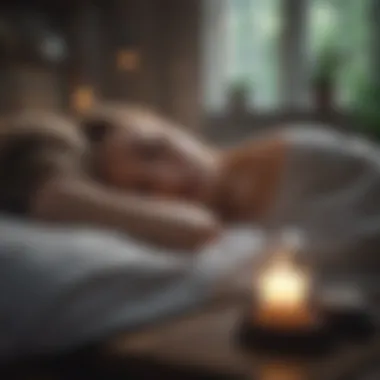Effective Strategies for Sleep During Manic Episodes


Intro
Achieving sleep during manic episodes can be a complex and challenging aspect for individuals coping with bipolar disorder. The heightened energy, racing thoughts, and euphoria associated with mania directly interfere with one's ability to sleep. As a result, many individuals find themselves in a cycle of sleep deprivation, worsening their mental and physical health. The exploration of effective strategies for promoting sleep during these episodes is critical, not just for immediate relief but also for long-term management of the disorder.
This article aims to provide comprehensive insights into the nature of manic states and how these states impact sleep patterns. It also presents a range of practical approaches that individuals can implement to enhance sleep hygiene, supportive therapeutic interventions, and environmental adjustments that can promote better sleep. Furthermore, various self-regulation techniques will be discussed to assist in coping with insomnia caused by mania. By delving into these strategies, the article endeavors to serve as an essential resource for those seeking rest and recovery during tumultuous times of their mental health journey.
Methodology
Study Design
The study is designed to assess existing literature on sleep disturbances during manic states, along with gathering anecdotal evidence from individuals with bipolar disorder. The design draws from both clinical studies and patient narratives to provide a well-rounded understanding of sleep challenges.
Data Collection Techniques
Data collection is accomplished through a variety of techniques. First, a review of peer-reviewed studies on sleep and bipolar disorder will be conducted. Simultaneously, interviews or surveys may be distributed to individuals experiencing manic episodes to gather contemporary insights. This dual approach allows for a broad perspective that encompasses clinical findings and personal experiences, providing a detailed overview of the factors impacting sleep during manic phases.
Discussion
Effective strategies for achieving sleep must be interpreted in light of the findings from the data collected.
Interpretation of Results
Interpreting results from the various studies indicates that sleep disturbances during mania are not merely a psychological issue; they often stem from biological, environmental, and lifestyle factors. A multifaceted approach that includes medication adjustments, cognitive-behavioral techniques, and environmental modifications tends to yield the best outcomes for sleep improvement.
Limitations of the Study
Several limitations can be noted. The subjective nature of sleep quality makes it difficult to quantify results. Different individuals may respond variably to the same strategies, influenced by their unique contexts and experiences. Furthermore, the cultural background may also play a vital role in how individuals manage their sleep during manic states.
Future Research Directions
Future research should focus on longitudinal studies that track sleep patterns over time, considering the interplay of treatments and individual coping mechanisms. Additionally, exploring the genetic underpinnings of sleep regulation in individuals with bipolar disorder may provide valuable insights for tailoring interventions specific to sleep challenges.
"Understanding the dynamics of sleep during manic episodes is essential for improving the quality of life for individuals with bipolar disorder."
Understanding Mania and Its Effects on Sleep
Understanding the implications of mania on sleep is essential for anyone affected by bipolar disorder. Manic episodes often disturb a person's natural sleep-wake cycles, leading to significant difficulties in obtaining restorative sleep. This is crucial because sleep deprivation can exacerbate manic symptoms and impair overall functioning. Moreover, comprehending how mania affects sleep can guide individuals in developing strategies to mitigate these negative impacts, enhancing their quality of life.
Defining Mania
Mania is a state characterized by an elevated or irritable mood, increased activity, and heightened energy levels. These episodes can vary in severity, duration, and impact on daily life. Individuals may experience a decreased need for sleep, excessive talking, racing thoughts, and impulsive behavior. Understanding these features helps in recognizing a manic episode and the urgency for effective coping strategies, particularly regarding sleep.
Common Symptoms of Manic Episodes
During manic episodes, individuals may exhibit a wide range of symptoms, including:
- Elevated mood: An abnormally upbeat or elated feeling.
- Increased energy: An overwhelming sense of energy and an inability to sit still.
- Racing thoughts: Thoughts may move rapidly, jumping from one idea to the next.
- Impulsiveness: Engaging in risky behaviors such as excessive spending or reckless driving.
- Sleep disturbances: A notably decreased need for sleep or insomnia can be prevalent.
These symptoms can vary widely among individuals, but the common thread is that they significantly disrupt daily tasks, including the ability to sleep soundly.
How Mania Disrupts Sleep Patterns
Mania disrupts sleep in several ways. First, the heightened energy levels often lead to reduced sleep duration. Individuals may find it difficult to fall asleep as their mind remains active with frenetic thoughts. Second, even if they do fall asleep, the sleep quality is frequently poor. The sleep may be fragmented, resulting in frequent awakenings and an inability to reach deeper sleep stages.
Additionally, the altered circadian rhythms associated with manic episodes can lead to irregular sleep-wake cycles. Sleep often happens at odd hours, making it challenging to establish a regular sleep routine.
"Understanding these dynamics is key to developing effective strategies for managing sleep during manic episodes."
In summary, recognizing the definition of mania, its symptoms, and its effects on sleep is fundamental for those managing bipolar disorder. Clarity in these areas provides a foundation for implementing targeted strategies to promote better sleep hygiene. This understanding serves as the first step in addressing the challenges posed by manic episodes.
The Importance of Sleep During Manic Episodes
Sleep plays a crucial role in regulating mood and mental health, especially for individuals experiencing manic episodes. Adequate sleep serves not just as a restorative function but as a fundamental component of emotional stability. When one lacks sufficient sleep, the body and mind endure significant stress, which can exacerbate the symptoms of mania. In this context, understanding the importance of sleep becomes imperative for anyone navigating bipolar disorder.
Consequences of Sleep Deprivation
Sleep deprivation can lead to several severe consequences for those in a manic state. The immediate effects include diminished cognitive performance, impaired judgment, and increased irritability. One might also experience difficulty concentrating or processing information, which can hinder daily activities and responsibilities. Further, studies have shown that ongoing sleep loss can contribute to longer and more intense manic episodes.


- Physical Health Risks: Lack of sleep can weaken the immune system, making individuals more susceptible to health issues.
- Mood Instability: The relationship between sleep and mood is interconnected. Sleep loss often results in heightened emotional responses and may lead to anxiety or depressive episodes.
- Risk of Relapse: In bipolar disorder, disruptions in sleep patterns can trigger a relapse, reinforcing the cycle of instability and further complicating treatment plans.
"Sleep is not merely a period of rest; it is a cornerstone of effective mood management."
Benefits of Restorative Sleep
Restorative sleep has numerous benefits that positively impact both mental and physical health. Prioritizing quality rest empowers individuals to regain control over their manic symptoms.
- Enhanced Mood Regulation: Quality sleep supports emotional balance. It allows for better processing of daily experiences, reducing the likelihood of mood swings.
- Cognitive Function Improvement: Well-rested individuals often exhibit improved attention span and decision-making capabilities.
- Physical Healing: Sleep promotes recovery in the body. It allows for muscle repair and replenishment of energy levels, crucial for overall wellness.
- Stress Reduction: Sufficient sleep can lower stress hormones in the body, paving the way for a calmer emotional state.
Establishing a Sleep Routine
Establishing a sleep routine is crucial for people experiencing manic episodes. It offers a structured approach to sleep, enhancing the chances of achieving more restful nights. This strategy often requires discipline and awareness. By creating a consistent sleep routine, individuals can help signal their body when it is time to wind down and prepare for sleep.
Setting Consistent Sleep and Wake Times
Setting consistent sleep and wake times lays the foundation for a successful sleep routine. The human body thrives on regularity, and having fixed sleep schedules helps regulate the circadian rhythm. This is especially important during manic episodes, where erratic sleep patterns can exacerbate symptoms. Aim to go to bed and wake up at the same time every day, even on weekends. This not only promotes better sleep quality but also helps in stabilizing mood swings related to bipolar disorder.
"Consistency is key. A regular schedule helps your body adjust and lowers insomnia risk."
Creating a Pre-Sleep Ritual
Creating a pre-sleep ritual is another helpful strategy. Engaging in calming activities before bed signals to the brain that it is time to relax. These can include reading a book, taking a warm bath, or practicing gentle yoga. Simple, quiet activities encourage the mind to settle and prepare for sleep. Avoid stimulating activities that might keep the mind racing. Establishing a routine of around 30 to 60 minutes helps train the body for optimal rest.
Minimizing Stimulants Before Bed
Minimizing stimulants before bed is of utmost importance for maintaining good sleep hygiene. Caffeine and nicotine are common culprits that can disrupt sleep patterns. Individuals should aim to avoid these substances at least 4 to 6 hours before bedtime. Alcohol, often thought of as a relaxant, can also interfere with sleep cycles, so it should be consumed in moderation and avoided close to bedtime. Choosing herbal teas or decaffeinated alternatives can be more conducive to establishing a restful sleep environment.
Adopting these strategies can greatly improve sleep quality during manic episodes. By creating a well-defined routine and making conscious lifestyle choices, individuals can pave the path toward healthier sleep and overall well-being.
Optimizing the Sleep Environment
Creating an optimal sleep environment is crucial when facing the challenge of sleep during manic episodes. Each element of the surrounding space can influence the ability to relax and fall asleep. Understanding how to adjust this environment will significantly enhance sleep quality.
Control of Lighting
Lighting plays a fundamental role in regulating the body's circadian rhythm. During manic episodes, increased exposure to bright light can exacerbate symptoms. To foster sleepiness, it is essential to keep the bedroom dark.
- Invest in blackout curtains to block outside light.
- Use dim lamps for evening illumination. Avoid harsh overhead lights at night.
- Consider a sleep mask if complete darkness is unattainable.
The lower the light, the more your body can produce melatonin, which is vital for sleep.
Temperature Regulation
Another critical aspect of the sleep environment is temperature. A too warm or cold room can disrupt sleep. The ideal bedroom temperature for deep sleep tends to be around 60-67 degrees Fahrenheit (15-19 degrees Celsius).
- Use fans or open windows to circulate air if the room tends to trap heat.
- Adjust bedding according to the season. Lightweight sheets in summer and thicker blankets in winter can help.
- Experiment with cooling pads or heated blankets to find the most comfortable sleep conditions.
Maintaining a comfortable temperature helps signal the body that it is time to sleep.
Reducing Noise and Distractions
Noise can be a significant barrier to achieving restful sleep, especially during manic phases when the mind is racing. To minimize distractions, consider the following strategies:
- Soundproof the room by sealing gaps around doors and windows.
- Use white noise machines or apps to create a consistent sound environment.
- Limit technology in the bedroom such as televisions and computers that emit sound and light.
Creating a quieter environment allows for deep relaxation, ultimately leading to better sleep.
"A well-optimized sleep environment can significantly improve the chances of getting restful sleep during manic phases. Every detail falls into place for effective sleep hygiene."
By focusing on these aspects of the sleep environment—lighting, temperature, and noise reduction—individuals can greatly enhance their prospects for falling asleep during manic episodes.
Therapeutic Interventions for Sleep
Therapeutic interventions for sleep during manic episodes are essential in addressing the challenges faced by individuals with bipolar disorder. These strategies aim to restore balance in sleep patterns and support overall mental health. Implementation of these interventions can mitigate the effects of mania on sleep quality, providing significant benefits. Understanding the types of approaches available allows individuals and mental health professionals to tailor interventions that best fit each person's specific needs.


Cognitive Behavioral Therapy for Insomnia
Cognitive Behavioral Therapy for Insomnia (CBT-I) is a structured program designed to identify and change thoughts and behaviors that cause or worsen sleep problems. It is based on the understanding that cognitive and behavioral factors significantly contribute to insomnia. Through CBT-I, individuals learn skills to better manage their thoughts about sleep, thus reducing anxiety associated with sleeplessness.
The therapy typically consists of several components:
- Sleep Education: Understanding how sleep works helps individuals identify the factors affecting their sleep.
- Cognitive Restructuring: Analyzing and changing negative thoughts about sleep can improve sleep quality.
- Sleep Restriction Therapy: This limits the time spent in bed to increase sleep efficiency over time.
- Stimulus Control: This focuses on creating conditions conducive to sleep each night.
Research indicates that CBT-I is effective in treating insomnia, particularly for those with mental health conditions such as bipolar disorder. By altering the way individuals think about and approach sleep, CBT-I can foster restorative sleep even in the face of mania.
Medication Considerations
While therapy plays a crucial role in sleep management, medication may also be necessary for some individuals. It is crucial to approach this option with care. Medications can help regulate sleep patterns and reduce the symptoms of mania that interfere with sleep.
Some common classes of medications used include:
- Mood Stabilizers: Lithium or lamotrigine can help stabilize mood and therefore improve sleep quality.
- Antipsychotics: Medications like quetiapine may promote sedation and assist with sleep initiation.
- Sleep Aids: Non-benzodiazepine sleep medications such as zolpidem can provide short-term relief for insomnia.
It is important to consider potential side effects and the risk of dependency when using sleep medications. Furthermore, medications should always be taken under the supervision of a healthcare provider who can monitor their effectiveness and adjust dosages as necessary.
Mindfulness and Relaxation Techniques
Mindfulness and relaxation techniques offer a mental approach to alleviating sleep disturbances during manic episodes. These techniques encourage individuals to focus on the present moment and reduce anxiety that often accompanies sleep struggles.
Common practices include:
- Mindfulness Meditation: This practice promotes awareness and acceptance of thoughts and feelings without judgment.
- Deep Breathing Exercises: Controlled breathing can help calm the mind and body, facilitating the transition to sleep.
- Progressive Muscle Relaxation: Involves tensing and relaxing muscle groups, which can ease physical tension and induce relaxation.
Research suggests that incorporating mindfulness practices into a daily routine can significantly enhance sleep quality. Individuals who actively engage in these techniques often report lower levels of stress and anxiety, leading to improved sleep outcomes.
"Therapeutic interventions for sleep during manic episodes can create pathways toward better mental and physical health, providing essential tools for individuals in managing their episodes effectively."
Self-Regulation Techniques
Self-regulation techniques play a crucial role in managing sleep challenges during manic episodes. These methods empower individuals to regain control over their bodily and mental states, promoting relaxation and enhancing the likelihood of achieving restful sleep. Understanding and applying these techniques can bring about notable benefits, including reduced anxiety, improved mood stability, and an overall enhancement in quality of life. Furthermore, self-regulation fosters a greater awareness of personal triggers, enabling individuals to implement proactive measures to mitigate symptoms.
Breathing Exercises
Breathing exercises are fundamental in self-regulation strategies. They assist in calming the nervous system, which is often overstimulated during manic episodes. One effective method is the 4-7-8 technique. This involves inhaling for four seconds, holding the breath for seven seconds, and exhaling for eight seconds. By focusing on breath control, individuals can redirect their attention away from racing thoughts.
Benefits of breathing exercises include:
- Lowered heart rate
- Decreased feelings of panic or anxiety
- Enhanced emotional regulation
In times of heightened emotional states, dedicating a few minutes to breathing exercises can create a sanctuary of calm, helping to pave the way for a more peaceful transition into sleep.
Guided Imagery Practices
Guided imagery practices combine visualization techniques with relaxation, helping individuals create calming mental images that foster tranquility. This method is particularly useful during manic episodes when thoughts may be erratic and overwhelming. By engaging the imagination, individuals can transport themselves to a serene location, such as a quiet beach or a peaceful forest.
This method provides several advantages, including:
- Distraction from distressing thoughts
- Enhanced focus on positive experiences
- Promotion of a tranquil mind conducive to sleep
Using audio recordings or following a structured guide can enhance the effectiveness of this practice. The imagery induces relaxation, thereby increasing the chances of falling asleep faster.
Progressive Muscle Relaxation
Progressive muscle relaxation is another effective self-regulation technique that involves systematically tensing and then relaxing different muscle groups. This practice helps individuals identify physical tension, which is often overlooked, and releases it consciously. The process starts with the feet and moves up to the face, allowing each area to relax completely.
The benefits include:
- Heightened awareness of tension in the body
- Reduction of physical symptoms associated with anxiety
- Enhanced induction of sleep states
As a simple yet powerful technique, progressive muscle relaxation can be incorporated into a pre-sleep ritual. By embracing this method, individuals can quiet their bodies and minds, fostering conditions favorable for sleep.
"Self-regulation techniques represent a clear, actionable path toward achieving rest during manic episodes."
When to Seek Professional Help
Seeking professional help is a critical step for individuals facing challenges in achieving sleep during manic episodes. Manic states alter the typical cognitive and emotional processes, often causing sleep disturbances that can exacerbate existing mental health issues. Finding appropriate interventions early can prevent further deterioration and enhance overall well-being. This section explores the significance of recognizing the necessity for professional guidance in dealing with sleep-related issues during manic episodes.
Identifying Warning Signs
There are specific symptoms that signal the need for professional help. When a person begins to notice a severe disruption in their sleep due to manic episodes, this can manifest in various ways:
- Extended periods of wakefulness: If insomnia occurs frequently over several nights, it is an indication.
- Heightened energy levels: Increased energy that lasts longer than typical can interfere with falling asleep.
- Erratic behaviors: Engaging in impulsive actions such as gambling or excessive spending can also hint at a need for assistance.
- Mood swings: Intense shifts in mood can result in difficulty winding down.
Recognizing these signs early can facilitate timely interventions. Individuals should track alterations in their sleep patterns and emotional states. Documentation can aid in discussions with mental health professionals.
Consultation with Mental Health Professionals
Consulting with a mental health professional is a proactive approach to managing sleep difficulties during manic episodes. Such professionals can evaluate the situation comprehensively and offer varied treatment options. Here are some key points to consider:
- Personalized assessment: A professional can conduct a full evaluation of one’s mental health status. Understanding the specific triggers and patterns of mania is fundamental.
- Integrated treatment plans: Specialists, such as psychiatrists and therapists, can create cohesive treatment plans that may incorporate medication, therapy, and lifestyle adjustments.
- Coping strategies: Through therapy, individuals can learn tailored coping mechanisms, enhancing their ability to manage manic symptoms and return to a more stable sleep schedule.
- Support networks: Professionals can connect individuals with support groups or resources, fostering a community of understanding and shared experience.
Seeking mental health support is not a sign of weakness. It reflects the strength to confront challenges head-on, yielding more effective outcomes.
Overall, professional support assists in establishing a stronger mental health foundation, equipping individuals with the tools necessary to manage manic episodes and improve their sleep quality.
Maintaining Overall Wellness
Maintaining overall wellness is a cornerstone in the pursuit of effective sleep strategies during manic episodes. The interplay of physical health, dietary habits, and social connections significantly influences an individual’s ability to manage their mental health condition. Each of these components contributes to creating a balanced lifestyle that supports better sleep quality and helps mitigate some of the symptoms associated with mania.
Importance of Regular Exercise
Regular exercise is not just beneficial for physical health but also acts as a vital element in enhancing sleep quality. Engaging in physical activity helps regulate mood and decrease anxiety. For individuals in manic states, exercise can serve as a natural outlet for excess energy. Different forms of exercise, such as aerobic workouts, yoga, or even walking, can be incorporated into daily routines.
The release of endorphins during exercise can lead to improved feelings of well-being, potentially counteracting the effects of manic symptoms. It is essential to find activities that are enjoyable and sustainable.
- Exercise helps establish a sleep-wake cycle.
- It reduces insomnia symptoms by tiring the body.
- Regular activity boosts overall mental health.
Nutrition and Its Role in Sleep
Nutrition also plays an imperative role in managing sleep quality. Eating a well-rounded diet helps provide the nutrients essential for brain function and emotional regulation. Certain foods are known to aid sleep, such as those high in melatonin and magnesium.
- Foods like cherries, almonds, and leafy greens may promote better sleep.
- A balanced diet contributes to maintaining stable energy levels throughout the day, reducing the risk of insomnia during nights of heightened mania.
- Avoiding excessive caffeine and sugary foods helps in stabilizing mood fluctuations.
Focusing on hydration is also crucial. Dehydration can lead to irritability and worsen depressive symptoms, making it harder to manage sleep.
Cultivating Social Support
Social support is an often-overlooked aspect of wellness. Building a reliable support system can have a significant impact on mental health during manic episodes. Friends, family, and support groups can provide understanding and assistance during challenging times.
Maintaining open lines of communication can allow individuals to express their feelings and experiences.
- Social connections create a sense of belonging and reduce feelings of isolation.
- Engaging in social activities can distract from manic symptoms.
- Support systems can offer practical help, such as reminders of sleep routines or encouragement to exercise.
Overall, integrating these elements into everyday life can contribute to an enhanced ability to achieve sleep during manic episodes. By addressing physical health, dietary choices, and social interactions, individuals can foster an environment that is conducive to rest and recovery.
Culmination
In understanding how to achieve sleep during manic episodes, one must recognize the critical role sleep plays in overall mental well-being. This article highlights several key strategies and underscores the complexities of manic behavior in relation to sleep patterns.
Sleep is not just a biological necessity; it is a foundational aspect of emotional regulation and cognitive function. During manic phases, individuals may experience heightened energy levels, creativity, and impulsivity, but these can often come at the cost of rest. Prolonged periods without sufficient sleep can exacerbate mood instability, impair decision-making abilities, and lead to further episodes of mania. Thus, the emphasis on establishing effective sleep strategies is paramount.
Key Considerations
- Physical and Mental Health: Adequate sleep impacts physical vitality and emotional stability. When individuals prioritize sleep, they enable better management of their mental state.
- Holistic Approach: The strategies discussed throughout this article encompass a holistic understanding of sleep hygiene, therapeutic interventions, and self-regulation techniques. These methods are not mutually exclusive but rather interconnected, reinforcing each other to enhance overall wellness.
- Support Systems: Involving family, friends, or mental health professionals can provide necessary support. These systems are vital in implementing and maintaining the strategies discussed.
The Benefits of Improved Sleep
By embracing a structured approach to sleep management, individuals may experience:
- Improved mood stability
- Heightened cognitive clarity
- Enhanced physical health
Incorporating practical strategies can lead to long-term improvements in sleep quality during manic episodes. Therefore, understanding and implementing these approaches is essential for individuals affected by bipolar disorder. As we conclude this discussion, it is clear that achieving restful sleep amidst mania is not just beneficial but essential for maintaining a balanced life.







